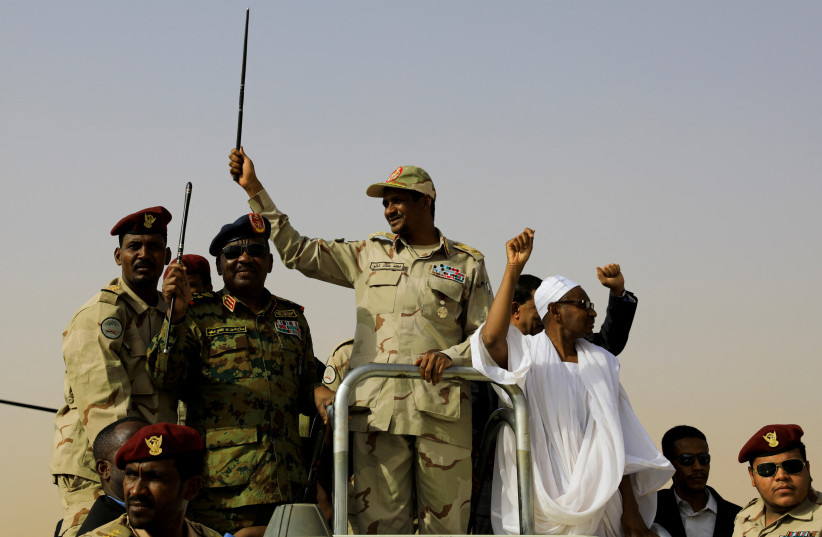Sudan's army said on Saturday it had agreed to help evacuate foreign nationals as sporadic gunfire and air strikes echoed across Khartoum despite promises by warring sides to cease fire for three days after a week of strife that has killed hundreds.
The statement citing army chief Abdel Fattah al-Burhan came after promises by rival Rapid Support Forces (RSF) leader Mohamed Hamdan Dagalo, known as Hemedti, to open airports for evacuations.
RSF leader promised to open airports
Sounds of fighting continued overnight but appeared less intense on Saturday morning than on the previous day, a Reuters journalist in Khartoum said. Live broadcasts by regional news channels showed rising smoke and the thud of blasts.
The army and the paramilitary RSF, which are waging a deadly power struggle across the country, had both issued statements saying they would uphold a three-day ceasefire from Friday for Islam's Eid al-Fitr holiday.
Sudan's sudden collapse into warfare has dashed plans to restore civilian rule, brought an already impoverished country to the brink of humanitarian catastrophe and threatened a wider conflict that could draw in outside powers.

There has been no sign yet that either side can secure a quick victory or is ready to back down and talk. The army has air power but the RSF is widely embedded in urban areas including around key facilities in central Khartoum.
Burhan and Hemedti had held the top two positions on a ruling council overseeing a political transition after a 2021 coup that was meant to include a move to civilian rule and the RSF's merger into the army.
The World Health Organization reported on Friday that 413 people had been killed and 3,551 injured since fighting broke out. The death toll includes at least five aid workers in a country reliant on food aid.
International efforts to quell the violence have focused on the ceasefire, with U.S. Secretary of State Anthony Blinken calling on them to honour the truce.
The US and some other countries have readied efforts to evacuate their citizens. The army said the United States, Britain, France and China would evacuate diplomats and other nationals from Khartoum "in the coming hours".
Saudi Arabia's embassy had already been evacuated out by land to Port Sudan and flown out from there and Jordan's would follow in a similar manner, the army added.
RSF chief Hemedti said on Facebook early on Saturday that he had received a phone call from U.N. Secretary General Antonio Guterres in which they "emphasised the necessity of adhering to a complete ceasefire and providing protection for humanitarian and medical workers".
The RSF said it was ready to partially open all airports to allow evacuations. However, Khartoum's international airport has been caught in fighting and the status of other airports or RSF's control over them is unclear.
Hospitals were hit
In Omdurman, one of Khartoum's adjoining sister cities, there were fears over the fate of detainees in al-Huda prison, the largest in Sudan.
The army on Friday accused the RSF of raiding the prison, which the paramilitary force denied. Lawyers for a prisoner there said in a statement that an armed group had forcibly evacuated the prison, with the detainees' whereabouts unknown.
The Sudanese doctors union said early on Saturday that more than two thirds of hospitals in conflict areas were out of service, with 32 forcibly evacuated by soldiers or caught in crossfire.
Some of the remaining hospitals, which lack adequate water, staff and electricity, were only providing first aid. People posted urgent requests on social media for medical assistance, transport to hospital and prescription medication.
Any let-up in fighting on Saturday may accelerate a desperate rush by many Khartoum residents to flee the fighting, after spending days trapped in their homes or local districts under bombardment and with fighters roaming the streets.
Sudan borders seven countries and sits between Egypt, Saudi Arabia, Ethiopia and Africa's volatile Sahel region. The hostilities risk fanning regional tensions.
The violence was triggered by disagreement over an internationally backed plan to form a new civilian government four years after the fall of autocrat Omar al-Bashir and two years after the military coup.
Both sides accuse the other of thwarting the transition.
